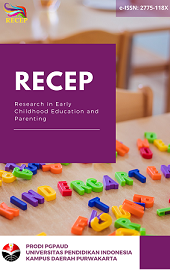PENGEMBANGAN KONTEN PEMBELAJARAN STEM UNTUK TAMAN KANAK-KANAK MELALUI KONSENSUS PAKAR
Abstract
This study aims to develop STEM learning content for kindergarten using the Fuzzy Delphi Method. Seventeen STEM learning content constructs were evaluated by a panel of experts to determine their relevance and appropriateness for integration into the Indonesian early childhood curriculum. The results show that 16 out of 17 constructs were accepted based on consensus thresholds and fuzzy scores. The constructed contents cover topics such as force and motion, energy, weather, environmental sustainbility, air-water-land, and the needs of living things. One construct was rejected due to developmental inappropriateness. The study highlights the importance of expert collaboration in ensuring pedagogical and developmental suitability of STEM content for young learners.
Keywords
Full Text:
PDF (Bahasa Indonesia)References
Berliner, D. C. (2004). Expert teachers: Their characteristics, development and accomplishments. Arizona State University.
Bodjonava, S. (2006). Fuzzy logic applications in education. International Journal of Emerging Technologies in Learning, 1(1), 1–6.
Bybee, R. W. (2010). Advancing STEM education: A 2020 vision. Technology and Engineering Teacher, 70(1), 30–35. (Hal. 1)
Chen, S. J. (2000). Fuzzy multiple criteria decision making. Lecture Notes in Economics and Mathematical Systems, 375–399.
Cheng, C. H., & Lin, Y. (2002). Evaluating the best main battle tank using fuzzy decision theory with linguistic criteria evaluation. European Journal of Operational Research, 142(1), 174–186.
Chu, H. C., & Hwang, G. J. (2008). A Delphi-based approach to developing expert systems with the cooperation of multiple experts. Expert Systems with Applications, 34(4), 2826–2840.
Chua, Y. P. (2010). Research Methods and Statistics: A module for social science students. McGraw-Hill Education.
Clements, D. H., & Sarama, J. (2009). Learning and teaching early math: The learning trajectories approach. Routledge. (Hal. 2)
Clements, D. H., & Sarama, J. (2016). STEM learning in the early years. In L. English & T. Moore (Eds.), Early Mathematics Learning. Springer. (Hal. 2)
Early Childhood STEM Working Group. (2017). Early STEM matters: Providing high-quality STEM experiences for all young learners. University of Chicago STEM Education. (Hal. 10)
Flavell, J. H., Miller, P. H., & Miller, S. A. (2002). Cognitive development (4th ed.). Prentice Hall. (Hal. 2)
French, L. (2004). Science as the center of a coherent, integrated early childhood curriculum. Early Childhood Research Quarterly, 19(1), 138–149.
Gambatese, J. A., et al. (2008). Role of research in construction education. Journal of Professional Issues in Engineering Education and Practice, 134(4), 358–364.
Habibi, A., Sarafrazi, A., & Izadyar, S. (2014). Fuzzy Delphi technique: Applications in qualitative and quantitative research. Technological and Economic Development of Economy, 20(3), 428–446. (Hal. 9)
Jamil, M., Hasan, M. K., & Noh, M. A. C. (2013). Application of Fuzzy Delphi method in the development of science curriculum for secondary school. Asian Social Science, 9(12), 80–87.
Jamil, M., & Noh, M. A. C. (2020). Use of Excel for Fuzzy Delphi analysis: An implementation guide. International Journal of Modern Education, 2(3), 1–11.
Kurniawan, D., & Nurfadhilah, S. (2022). Evaluasi kegiatan belajar anak usia dini di Indonesia. Jurnal Pendidikan Anak, 5(2), 80–89. (Hal. 3)
Lestari, E. (2021). Pemahaman guru PAUD terhadap pendekatan STEM. Jurnal Pendidikan Anak Usia Dini, 9(1), 45–56. (Hal. 3)
Margorini, R., & Rini, D. (2019). Strategi pembelajaran konvensional di taman kanak-kanak. Jurnal Pendidikan Anak, 6(1), 12–20. (Hal. 3)
Murray, J. W., & Hammons, J. O. (1995). Delphi: A versatile methodology for conducting qualitative research. The Review of Higher Education, 18(4), 423–436.
National Research Council (NRC). (2013). Next generation science standards: For states, by states. National Academies Press. (Hal. 1, 6)
Sari, R., & Rahmawati, Y. (2023). Tantangan implementasi STEM di PAUD: Studi kasus di kota X. Jurnal Ilmu Pendidikan Anak, 11(2), 113–125. (Hal. 3)
Tang, Y., & Wu, H. (2010). A Fuzzy Delphi and Fuzzy AHP approach to evaluating e-learning platform. Expert Systems with Applications, 38(8), 9786–9792.
Torres-Crospe, M., Garibay, C., & Godina, R. (2014). Integrating culture and STEM in early childhood. Early Childhood Education Journal, 42(4), 265–273. (Hal. 2)
Vygotsky, L. S. (1978). Mind in society: The development of higher psychological processes. Harvard University Press. (Hal. 2)
Yildirim, B. (2020). The effect of STEM applications on the science and mathematics achievements of 4–6 year-old children. Early Childhood Education Journal, 48, 513–522. (Hal. 2)
DOI: https://doi.org/10.17509/recep.v6i1.84766
Refbacks
- There are currently no refbacks.
Copyright (c) 2025 Research in Early Childhood Education and Parenting

This work is licensed under a Creative Commons Attribution-ShareAlike 4.0 International License.

This work is licensed under a Creative Commons Attribution 4.0 International License.



